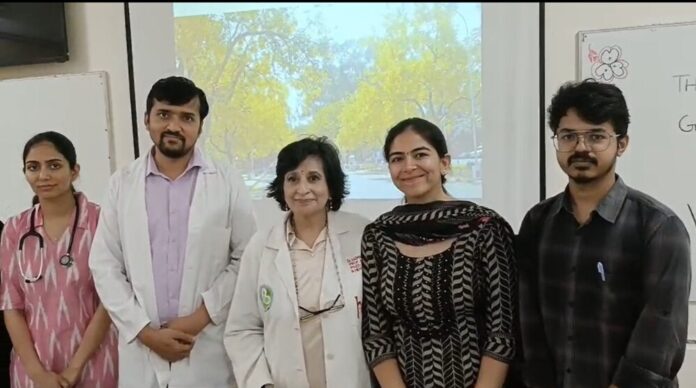PGIMER’s Pediatric Gastroenterology Division Observes World IBD Day with a Strong Call for Awareness and Timely Intervention
Collaborative efforts of Government, Society, and Schools vital to improving care and support for children with IBD : Prof. Sadhna Lal
PGIMER’s Division of Paediatric Gastroenterology and Hepatology, organized a significant Patient Awareness Session on Paediatric IBD, to mark World Inflammatory Bowel Disease (IBD) Day. The purpose was to raise awareness about the increasing incidence of IBD among Indian children, dispel prevalent myths, and emphasize the importance of early diagnosis during the “window of opportunity” and comprehensive management of this chronic, often debilitating condition.
During the Session, Dr. Sadhna Lal, Prof. & Head, Division of Pediatric Gastroenterology and Hepatology, PGIMER highlighted the growing prevalence of paediatric IBD in India, noting that factors such as dietary changes, urban lifestyles, and antibiotic and acid suppressant overuse may have contributed significantly to this rise. She expressed concern over the widespread misinformation about the disease, which can hinder timely treatment and proper care. “IBD in children is no longer rare. Factors like dietary changes, urban lifestyles, and the overuse of antibiotics have contributed to this growing burden. What’s deeply concerning is the amount of misinformation in public discourse,” she said.
Emphasizing the vital role of public healthcare in combating misinformation and ensuring early diagnosis, Dr Lal said, “If public-sector research and education don’t step in, patients fall prey to half-truths and delayed treatments. In paediatric IBD, timely diagnosis, tailored treatment, and informed choices are crucial — not just for disease control but also for a child’s growth, schooling, and social well-being and integration as a productive individual,” she stated.
Dr Lal underscored that pediatric IBD with onset from less than year to 18 years, often manifests more severely than in adults, with a higher likelihood of requiring surgical intervention and potential long-term developmental impacts. “Treating children like small adults is a clinical misjudgment. Pediatric IBD demands pediatric expertise, and children upto at least 18 years with IBD must be treated by Paediatric Gastroenterologists not Adult physicians due to the different behaviour and special needs of this population” she emphasized.
During the session, Dr Lal, explained the differences between Ulcerative Colitis and Crohn’s Disease, the two most common types of IBD. She also highlighted monogenic IBD, which affects only children under two to 5 years of age and requires a distinct approach for diagnosis and needs tailored treatment.
The importance of nutrition was also emphasized, with Dr. Lal advocating for a diet based on fresh, well-cooked, natural foods, while cautioning against processed, spicy, and fried items that can worsen inflammation. “Well-cooked, fresh, and natural food forms the base of dietary therapy, while processed, spicy, and deep-fried foods exacerbate inflammation and must be avoided,” she advised.
Dr. Chennakeshava Thunga, Assistant Prof., Division of Paediatric Gastroenterology and Hepatology, PGIMER explained, “Symptoms such as abdominal pain, cramping, blood in the stools, and chronic diarrhoea may indicate a condition called inflammatory bowel disease (IBD), in which parts of the intestinal tract become inflamed”.
Since establishing the IBD Clinic in 2018, PGIMER has observed a significant increase in paediatric cases—from 7-8 annually to approximately five new cases each month—reflecting both a genuine rise in incidence and improved recognition and diagnostic capabilities. “While there is currently no cure for IBD, regular medications and visits to the doctor can help the vast majority of children feel better and resume many of their regular activities,” concluded Dr. Lal.
Dr Lal also highlighted that stress is a major trigger for IBD flare-ups and stressed the importance of societal and educational support for children living with the disease. “Since the disease is a lifelong condition, society and schools need to adopt a more sympathetic approach towards these children to help reduce their stress and enable them to lead a near-normal life,” she said.
Dr. Lal presented a comprehensive framework involving the government, society, and schools to enhance care and support for children with IBD. She emphasized educating families about the disease, reinforcing the importance of diet, medication, and stress management, and helping physicians identify individual triggers and develop coping strategies. “Ensure fully informed consent when considering experimental therapies,” she added. The way forward also included strengthening social and financial support systems, raising awareness among educators to provide better school support—especially by reducing examination-related stress—and collaborating with pharmaceutical companies and the Government of India under the ‘Make in India’ initiative to reduce treatment costs and improve access.
The event was supported by Dr. Chennakeshava Thunga, Assistant Prof, and other senior residents, who engaged with parents, caregivers, and media by answering questions and providing guidance. The program, held at the APC Auditorium, included interactive sessions aimed at enhancing understanding of paediatric IBD and offering practical dietary advice tailored specifically for young patients.
The event brought together healthcare professionals, parents, caregivers, and the media to foster a better understanding of paediatric IBD and the challenges faced by affected children, urging parents, healthcare providers, and the medical community to recognize early signs of IBD, avoid unnecessary delays, and ensure children receive compassionate, evidence-based care that addresses their unique needs.















